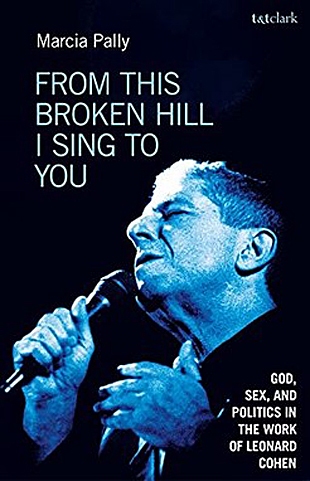There is a lot of interest in musician Leonard Cohen’s life and music now, five years after his death. We recently reviewed another book that bears similarities to this one.
This volume, by professor Marcia Pally — who teaches at New York University, at Fordham University, and is an annual guest professor at Humboldt University’s Theology Faculty — goes even deeper. It originated in a seminar Pally gave to university students interested in the theology of Leonard Cohen. Pally examines how he was, at times, both priestly and prophetic.
The first topic she covers is theodicy: the problem of the existence of evil and suffering, if there is a loving and powerful God in the universe. Pally frames her discussion on this theme as “arguments with God about evil, suffering, and God himself,” which anyone who has listened to Leonard Cohen’s music knows is a very apt way of putting one of his preoccupations.
Next, she addresses issues of what she calls “Covenantal Theology,” most namely, the covenant (mutual agreement) that God is supposed to have with human beings generally and the Jewish people specifically. Cohen was raised Jewish and identified as Jewish; he once wrote: “How beautiful our heritage, to have this way of speaking to eternity.” These theological ideas are also in his music and his poems, and Pally is a reliable guide. For a sample — which includes her commentary and extensive quotations from Cohen lyrics — see the excerpt accompanying this review.
She covers many other topics, too. For example, she looks at how Cohen’s relationships with women did not always support his spirituality. “As he failed to sustain covenant with God, Cohen foiled human intimacy,” she summarizes. She steers into politics, too, and into religious imagery that is not Jewish, pursuing Leonard Cohen's interest in Buddhism (he spent five years in a Zen monastery) and Christianity (especially Jesus).
The author concludes with reference to the Hebrew word, hineini, or “here I am.” This is an expression common in the Hebrew scriptures of the Bible for key characters (patriarchs Abraham and Isaac, the prophet Jeremiah, etc.) to say to the God who demands much of them; it's something like, “I am ready.” Hineini is the one Hebrew word that appears in Leonard Cohen songs without being translated. There was something about being faithful to a Divine Presence to which he kept returning, but did not ultimately respect. Pally explains this very well, when she writes at the end that Cohen had “a not-quite-content commitment to the inscrutable, provocative God.”
This is a mostly scholarly book, but if you are seriously interested in theological ideas and Leonard Cohen, you fill find much of interest.
